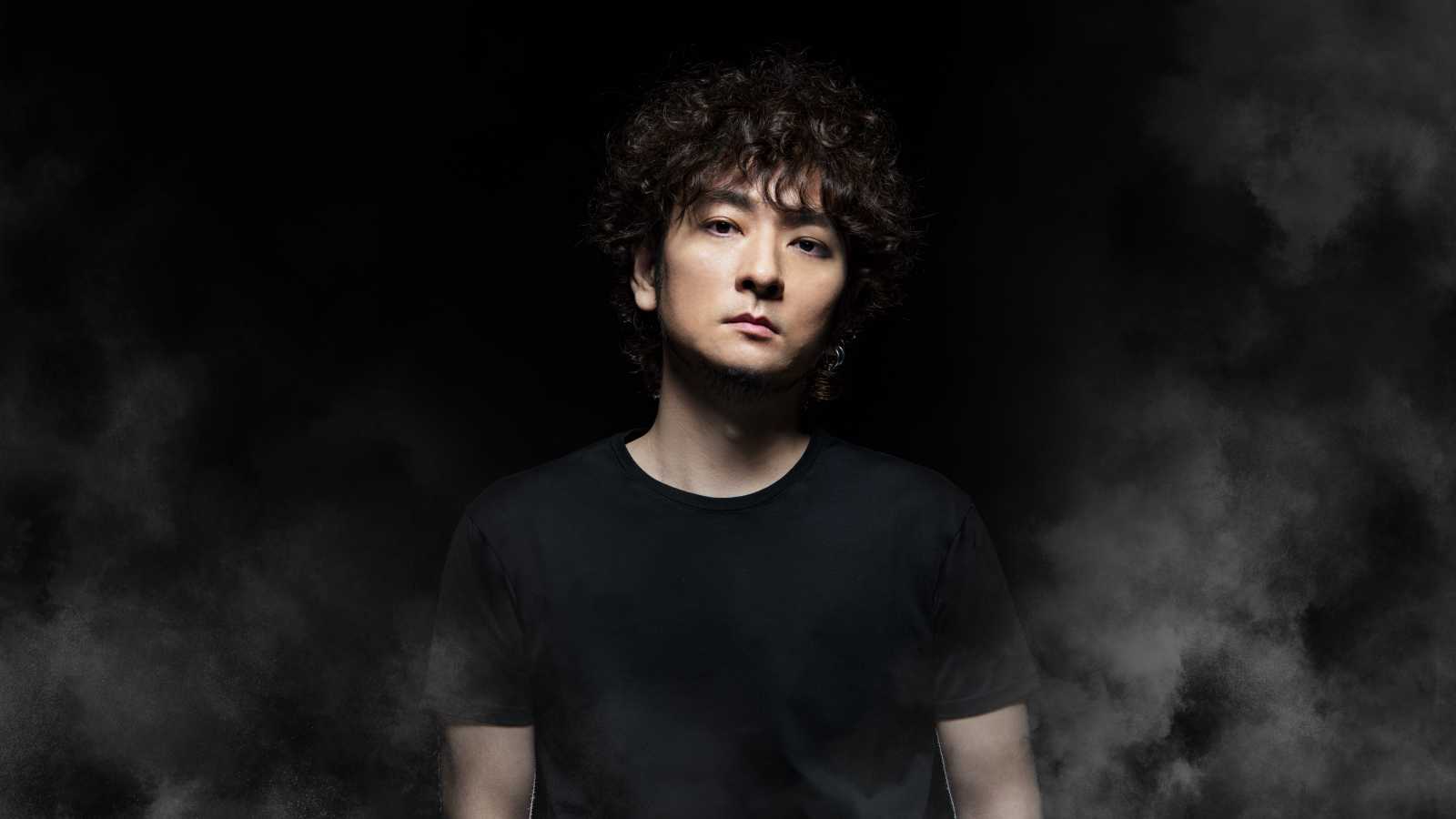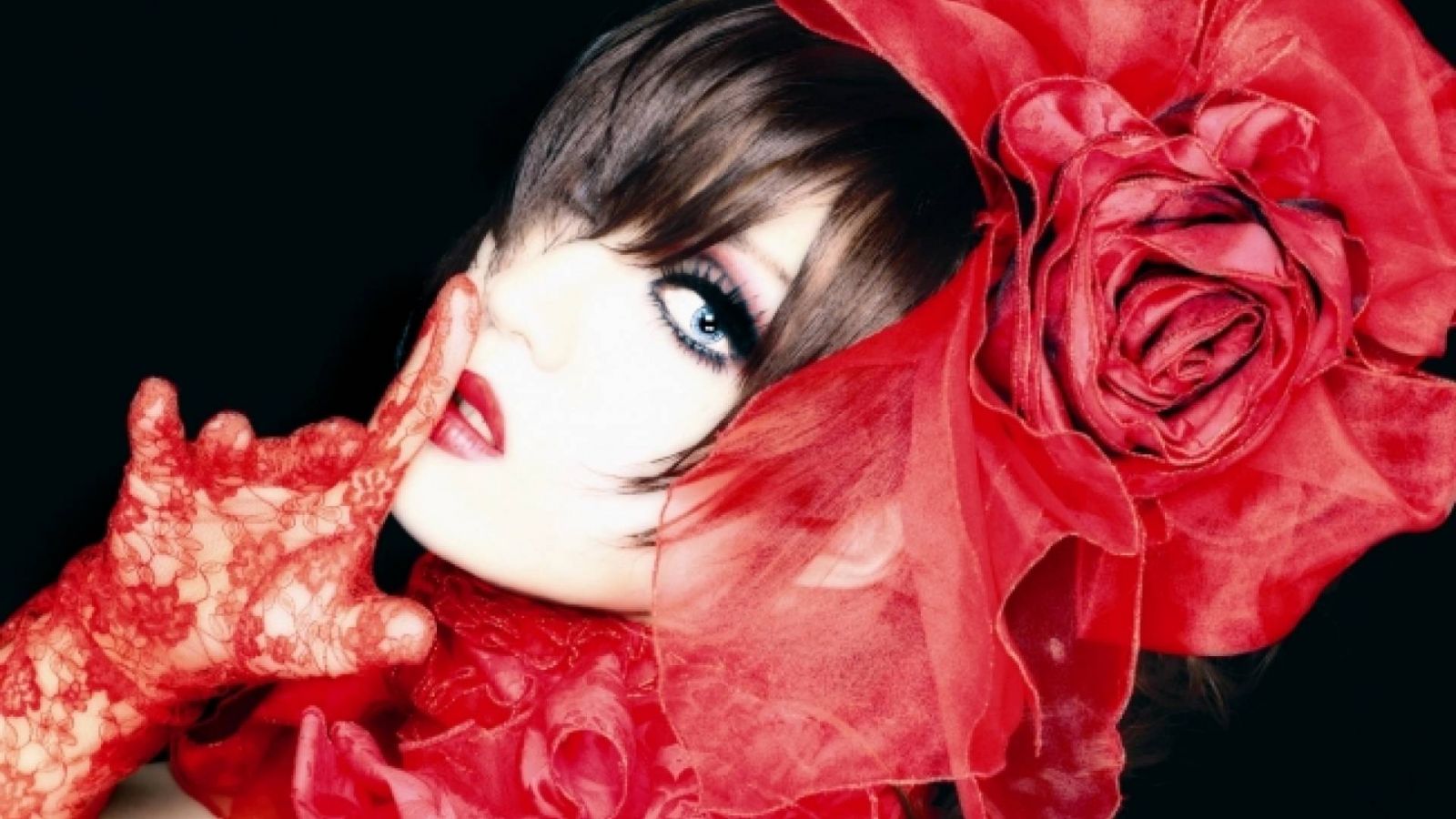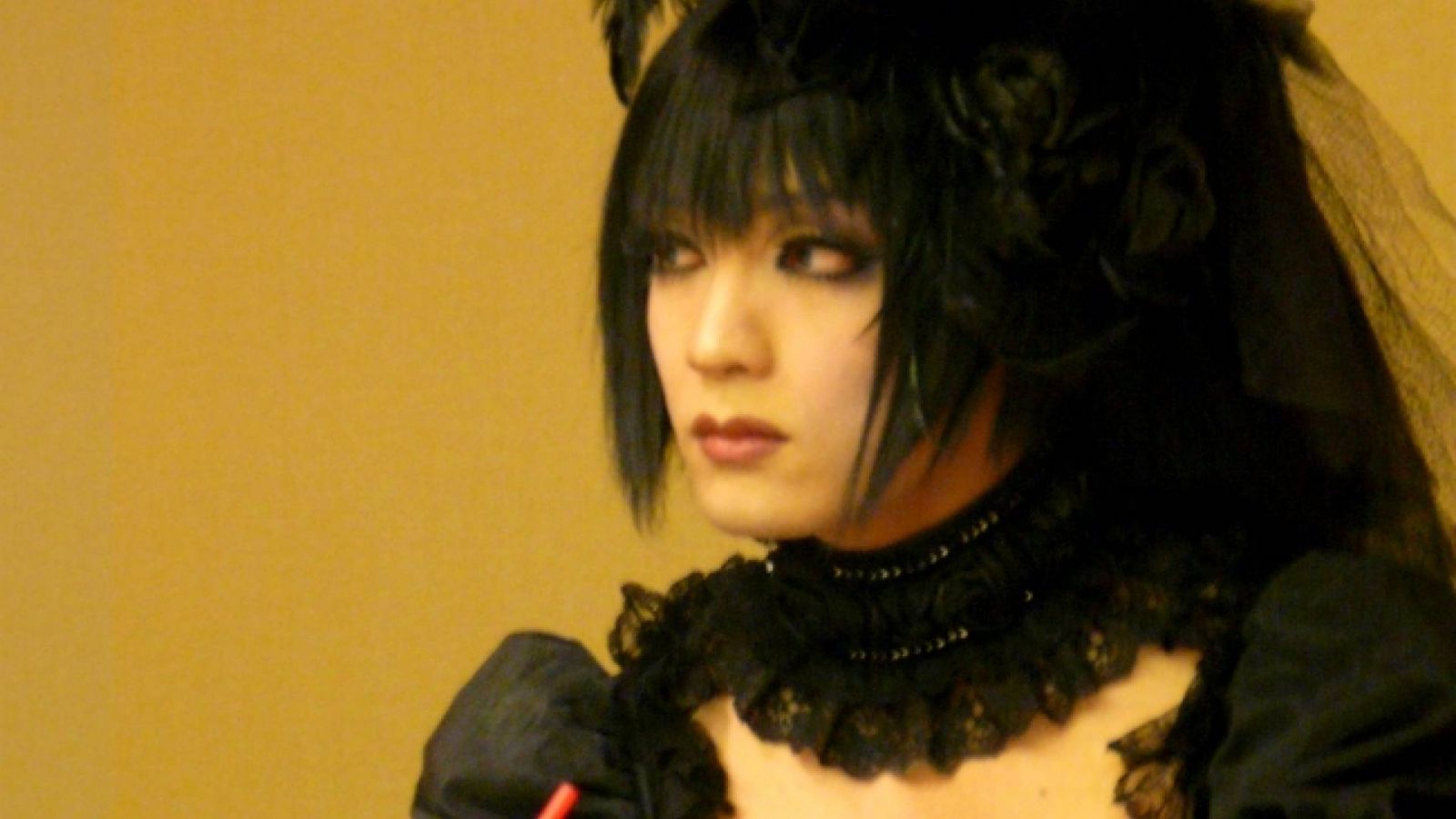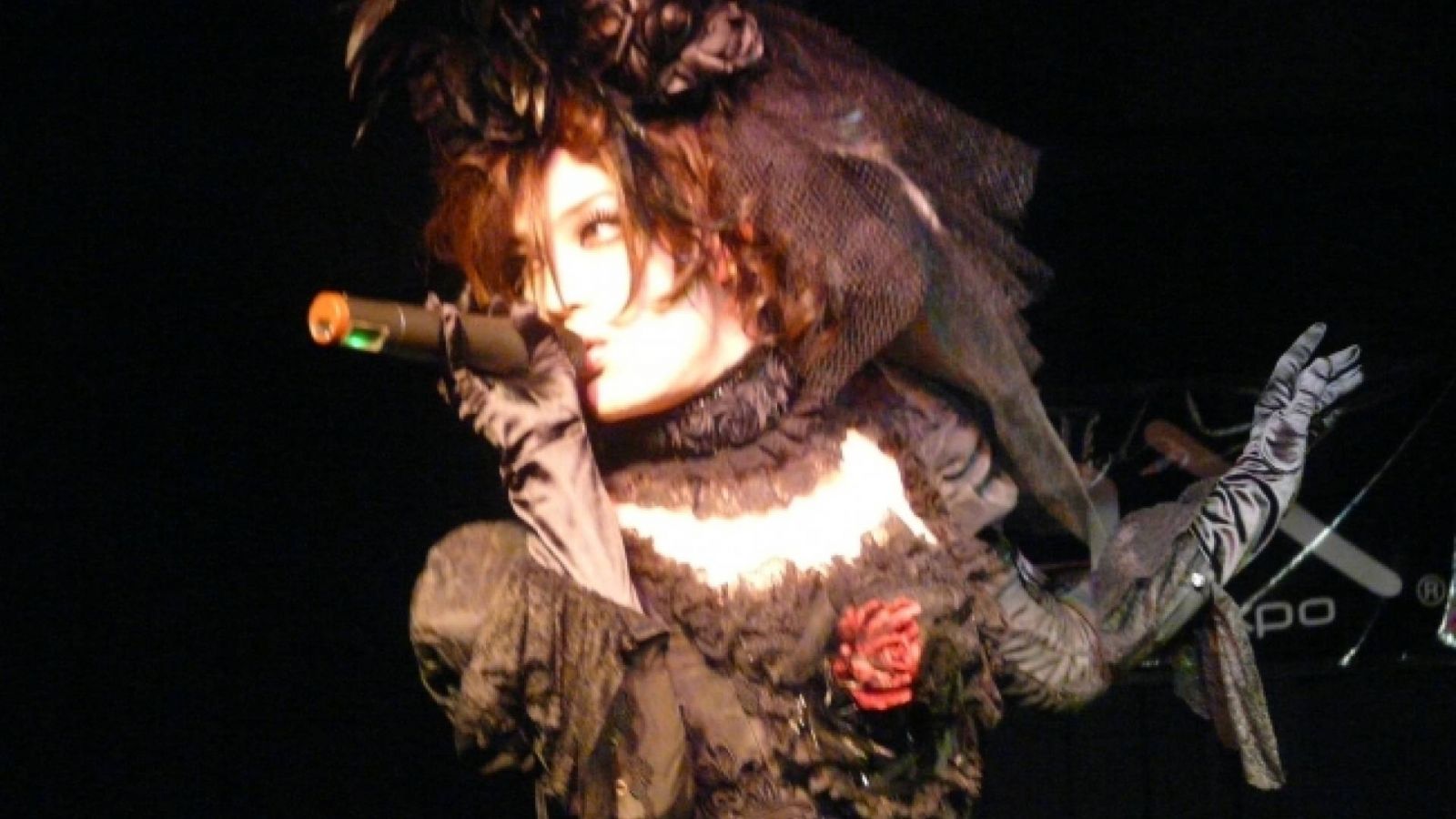At the American convention PMX, the solo artist Kaya participated in a fan Q&A session and a press conference.
Kaya’s first performance outside of Japan was November 08, 2008, at Pacific Media Expo in Los Angeles. The day after a stunningly beautiful live, he met with his fans for a question and answer session. Wearing his black Chocolat outfit and sniffling with a cold, he still managed to light up the room with his beautiful smile and combine a lighthearted sense of humor with penetrating insights about achieving success and happiness.
What do you think everyone can do to achieve beauty?
Kaya: You should all be in love, as much as you can. I have a lot of lovers, male and female-- quoting KAMIJO from Versailles-- so please fall in love very often!
What is your favorite song to sing live?
Kaya: Glitter Arch and Kasha.
I know that Hora still writes a lot of your songs, so I was wondering how the creative process is different between the two of you between Schwarz Stein and now.
Kaya: In Schwarz Stein, the creative process was fifty-fifty and incorporated what we both liked. Now, I would go to Hora and say, "I want a song that sounds like this," and Hora would make the song for me.
What was your favorite aspect of the show last night?
Kaya: I enjoyed all aspects of it.
I wanted to ask; do you like all kinds of music, or is there a kind of music that you don’t like?
Kaya: I like all kinds of music, only not hip-hop. It doesn’t really fit my image.
Do you like country?
Kaya: *laughs*
One of the things I admire you most for is that you’ve gone through hardships, and yet you’ve continued to pursue your dreams. So I was wondering; what is the biggest obstacle you have conquered on your way to becoming who you are today?
Kaya: Uhmmm... obstacles... I have been through a lot of obstacles, and there isn’t one that I can single out, but at times, I have been helped by friends and staff, so I didn’t have to fight on my ownso I really appreciate all the help from friends and staff members.
I was watching your videos this morning and I really love the dance moves that you have; how long does it take you to learn the dances to your songs?
Kaya: It takes one or two days; Yui (one of Kaya’s dancers) does the choreography, and some moves are thought up by me as well, but often during lives, there are moves that are spur-of-the-moment.
Last year, you had a mini-tour with Versailles and Juka in Japan, so I was wondering if you wanted to do something similar in the US?
Kaya: There’s nothing in the plans right now, but if things work out, I would like to.
How did you like the chocolate I gave you on Friday?
Kaya: It was delicious; I ate it in my room.
What did you like best of the places you went to in LA?
Kaya: The club! The club was really, really fun, but the live was even better.
I was wondering what it was like to work with Juka and KAMIJO.
Kaya: Really fun. They are both very nice people to work with. I like to play pranks on Juka to see his reactions. I like to tickle him and stuff...
I am sure to many of your fans, you are an inspiration, especially the ones who want to have a career in music and start a band. What advice would you give them?
Kaya: You have to be clear on what exactly you want to do. Do not be afraid of any challenges and visually think of what you want to become and you would be able to achieve what you want to do. You have to have the mental image of yourself being successful in your head.
Performing for an American audience last night, did the audience surprise you in any way?
Kaya: I was surprised by how passionate everyone was and how powerful your cheering was. (in English) Very good!
I was wondering where your costumes come from. Do you design them, and how long does it take?
Kaya: Yes, I design them. It doesn’t take that long to design, because I already have an image in my head.
I know earlier this year you performed with Node of Scherzo, and also with the session band Regina. I was wondering if you had plans to possibly form a band in the future or do more collaborative work with other artists?
Kaya: Since I am a solo artist, there are a lot of things I can do.
I am asking this question for my friend here, who is too shy.
Kaya: (turns to shy fan and looks at her)
She wants to know if she could keep you.
Kaya: (jokingly) I am very expensive. Very high-maintenance.
Hi, my question is, if you weren’t singing right now, what would you be doing?
Kaya: There’s a lot of things I would like to do, such as being a designer, or aproducer or going to college; maybe first, going to college.
Fan wearing HIZAKI cosplay starts to speak
Kaya: Ah! HIZAKI-san!
Can you please sing a piece of Paradise lost? Do you mind?
Kaya: Paradise lost... Do you want to start?
Uhm, I’m nervous
Kaya: Do you want to sing together?
...
Kaya: Which part do you want to listen to?
Any is fine.
Kaya: It’s difficult.
Translator (suggests chorus)
Kaya: (quietly sings two lines.) Was that good?
Yes, Thank you.
I was wondering if you had any advice for the LGBT (lesbian gay bisexual transgender) community.
Kaya: You don’t need to be ashamed of who you like, and you should go ahead and embrace whoever you want.
What is your most central belief about what allows a person to live a good a wholesome life?
Kaya: You have to always be appreciative of your family, friends, lovers...
KAMIJO!
Kaya: (laughs)
Kaya: (serious again) Also, don’t lie to yourself.
Have you ever written any songs to KAMIJO?
Kaya: Not yet. But I will probably think about doing one. Besides KAMIJO, I have about a hundred more lovers. (laughs)
Can I be one of your lovers?
Kaya: (in English) Sure!
What kind of influences have you received from Mana-san?
Kaya: Mana-san is a person for whom everything has to have meaning, and who goes a lot into the details. So I learned a lot from Mana.
I love your laughter.
Kaya: Thank you.
I wanted to ask if you had a special ritual that you did before coming onstage.
Kaya: I pray.
And also, can I borrow KAMIJO?
Kaya: You would have to pay me a rental fee.
Translator: How much do you think that would be?
Kaya: You probably at least have to pay the plane ticket.
Kaya: KAMIJO probably would be upset if he hears this, though. So shhhh! (whispers) This is a secret!
What do you like to do in your free time?
Kaya: I like to go see theater, musicals, and kabuki shows. I go out with a lot of people, I go on dates you know, each of the one hundred lovers takes turns.
Who has been your biggest inspiration in life?
Kaya: My mother and Akihiro Miwa. (turns to a Japanese fan in the first row) Do you know who that is, the singer? Can you explain?
...
Kaya: Let’s just say my mother, then.
Back when you were in Schwarz Stein, what was your favorite song to perform live?
Kaya: New Vogue Children and Creeper. Do you know them?
We just had our presidential elections, so I was wondering, if Kaya was the president, what would he do?
Kaya: Everyone has to carry a rose. But, to become American president or Japanese president?
Just president in general.
Kaya: I will make the whole country into Glitter Arch. (laughs)
Kaya: (serious) I would like to eliminate any discrimination based on religion, sexual orientation, or interracial marriages.
On stage, you are always so cute, but when you sing, you have this power.
Kaya: (satisfied laugh)
How do you reconcile that with your cuteness? Because when you dress in Lolita, people don’t take you seriously at all; how can you let your personality show?
Kaya: You should be able to wear whatever you like, and be proud of what you wear. If every person can slowly change how they think, then the world would become a more beautiful place.
Do you play any other instruments?
Kaya: The piano, a little, little bit.
With this, the time for questions was over. Kaya accepted presents and letters from his fans, and headed to another room to join JaME and other press for a second panel.
You spoke earlier in the fan panel about promoting equality. California recently had a big battle over Proposition 8 (a proposition ballot to change the California state Constitution to say marriage is between a man and a woman only, taking away same-sex marriage rights), which passed on a very very small margin and people are trying to overturn it, so I was wondering if you are aware of this and if you’re following it at all.
Kaya: I think it’s really silly that people should be against gay marriage, and I think everyone should be able to marry whoever they want. It’s a really old way of thinking that only a man and a woman can marry. I think that America is a country of freedom, so I’m really surprised something like this is not allowed.
In Japan, the stereotypical path for a young adult is to go to high school, then to go to cram school, then to go to college, then to have a blue-collar job, then to have kids and repeat the process, and you’ve obviously taken a very different path. Amongst your more traditional peers or maybe family members, how is this lifestyle perceived?
Kaya: Of course, I’m seen as very different and people look at me weirdly, but I want to eliminate all that discrimination; to not think about it and just keep doing what I want to do.
I was wondering if your family was supportive of your choice of profession.
Kaya: Yes, they support me fully.
In Japan, with the culture and with the visual kei scene, the effeminate man is actually not as unusual. Do you find any difference in how accepting US audiences are to your presentation compared to Japanese ones?
Kaya: I think that on average, the Japanese are still more conservative and that actually, Americans are more accepting of the way my fashion is.
What image or costume do you plan to have for your new single?
Kaya: I already have an image for it; my next single will be Last Snow, and because it’s snow, I’ll be wearing a white dress.
Where do you draw inspiration for your costumes? Do you design them all yourself, or do you have a stylist?
Kaya: I get a lot of ideas from musicals, theaters and kabuki shows, and probably kabuki is one of my biggest influences. I do talk with a designer about finalizing my designs.
In the fan Q&A, you say you drew a lot of inspiration from Mana. Mana designs his own clothing line, which has been hugely successful, so in the future, do you have plans to design your own clothing line or accessory and jewelry line?
Kaya: I haven’t planned anything, but I would be interested in doing something like that.
If you were to go to college, what would you study?
Kaya: I would like to study history: world history, American history, European history, because I aim to change to future and in order to change the future one needs to fully understand the past.
Does anything stand out in your mind from last night’s concert, something memorable?
Kaya: I was really moved by the audience singing Chocolat with me in Japanese, because it was my debut single, and I was so touched I almost started crying.
As a vocalist, do you find karaoke is fun, or do you think of it as more work? Do you go to karaoke for fun?
Kaya: Before, I used to enjoy it as a fun pastime, but now it seems more like a work-time for me. But still I like singing, so I enjoy karaoke.
You have mentioned that you enjoy performing live, but you don’t like recording so much. Can you tell us what you don’t like about recording?
Kaya: Lives are a much better experience where everyone sings together and can enjoy that space, and during recording, I just sing alone in a booth, so I really don’t like that.
Do you prefer a smaller or a bigger venue to perform, and which is your favorite venue to perform?
Kaya: I like both, and I don’t have a favorite place. I don’t mind of I have an audience of one or one thousand; I just enjoy making music with someone, enjoying music with someone.
Within visual kei, the music and the looks both have meaning. Is there any meaning behind your choreography?
Kaya: All my moves support my lyrics: if I’m singing about cheeks, I would be touching my face; if I’m singing about rain, I would raise my hand.
What sort of things do you do to preserve your voice? I know some artists go to quite some lengths and put humidifiers in their rooms
Kaya: I try to cut down on drinking and I don’t smoke. I try not to think so much, "Oh, I have to protect my voice," but just relax.
How did you figure out that singing and performing is your inspiration and the path to which you’re called in life?
Kaya: I think it’s just fate; it’s how things came about. I’ve always wanted to sing, since I was three.
Is this your first time in the US?
Kaya: Yes. I’ve been to Hawaii, but it’s my first time in mainland US.
Then, what is your reaction to California’s culture?
Kaya: I haven’t really been around too much, so I haven’t gotten the big picture, but I was surprised by how big the hamburgers were.
Last night at the concert, you spoke to the audience in Japanese and many people understood and spoke back. Were you surprised by how many people understood it?
Kaya: I was very surprised, and very, very happy.
Other Lolita and VK artists use a lot of French and German in their lyrics, but you don’t. What do you think about using these languages in music for lyrics and song titles, and do you think it’s necessary to promote one’s image properly?
Kaya: I think it depends on the song; if there’s a necessity, then yes, but so far there hasn’t been a need to use many foreign lyrics. I love the Japanese language and I think there’s a lot of depth to it, so I want to keep using just Japanese so people can learn more about the Japanese language.
At the show last night, you had a lot of interaction with the audience, which was really amazing. Is this natural and spontaneous, or was it intentional and planned? And also, are Japanese or American audiences more interactive with your performance?
Kaya: It just comes naturally, spur-of-the-moment. I think reaction-wise, Japanese and American audiences are about the same, but Japanese audiences are still a little shyer.
How do you feel about fans who cosplay you?
Kaya: I like it, and I’m really happy when people cosplay as me.
The name Kaya is very unique: what is its origin and how did you decide on it?
Kaya: It’s derived from my real name; I put a twist on my real name and it became Kaya.
What’s the most rewarding part about being a performer as a profession?
Kaya: (thinks) I think the most rewarding is to be able to see beautiful scenarios; to be able to look at the audience from the stage. What is also very rewarding is that I can meet a lot of people, more so than if I had a regular profession. You can learn a lot from meeting people, and I am very happy to be able to meet everyone here today.
We are happy to meet you as well!
Kaya: (in English) Thank you!
There are not really many girls in visual kei in Japan, so what do you think about girls who try to- or do you think more girls should try and get into the scene?
Kaya: There should be more girls in visual kei, because sex is not a problem; it shouldn’t hinder your career.
There are many men in visual kei who dress as women and present a high level of aesthetic beauty. Do you think women don’t enter visual kei because they feel they can’t compete or they feel threatened by men dressing as women as well? So how can you preserve your own femininity in a genre where men dress as women as well?
Kaya: I’m not sure if there are girls who are afraid of getting into visual kei because they’re not sure they can look as pretty; there really aren’t any girls around me who do visual kei, so I don’t know how they feel about it, but if I meet one, I’ll ask.
How old were you when you first decided to embrace an androgynous image, and how was that perceived by your peers?
Kaya: My goal wasn't, "I want to wear female clothes". I just wanted to wear what I wanted to wear, and that’s how I started. That was when I was 17. Of course, people around me were, "Oh my god, what are you wearing, why are you dressed as a girl." Actually, people even threw stones at me. But I just kept on doing what I wanted.
Also, can you tell us a little about how you were in high school?
Kaya: Basically, in high school, even though we had a uniform, I’d still wear platform boots and make-up to school, so I was a very different high school student.
What message would you like to send to your fans in the US?
Kaya: I think that a lot of people, when they think about visual kei, they think about a band, and maybe they're not too sure about what Kaya is, because he's not a band. In the future, I would like to do a lot more lives in the US and also release CDs here, so I want everyone not to be picky, "Oh, I don’t know what it is, I’m not going to try it." I want everyone to show support and give me a try.
Unfortunately, Kaya had to rush to an autograph session at the Cure store in LA, so at this point, the press conference came to a stop. We are grateful for the chance to talk to him on the occasion of his US debut, and wish him success in all his pursuits!

![HYDE [INSIDE] LIVE 2024 -EXTRA- at Makuhari Messe](https://www.jame-world.com/media/image/2024-11/_16-9_14951.jpg)





